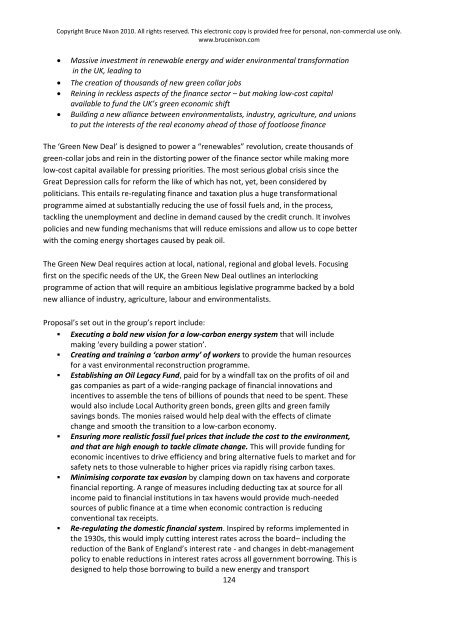A better world is possible - Global Commons Institute
A better world is possible - Global Commons Institute
A better world is possible - Global Commons Institute
You also want an ePaper? Increase the reach of your titles
YUMPU automatically turns print PDFs into web optimized ePapers that Google loves.
Copyright Bruce Nixon 2010. All rights reserved. Th<strong>is</strong> electronic copy <strong>is</strong> provided free for personal, non-commercial use only.<br />
www.brucenixon.com<br />
<br />
<br />
<br />
<br />
Massive investment in renewable energy and wider environmental transformation<br />
in the UK, leading to<br />
The creation of thousands of new green collar jobs<br />
Reining in reckless aspects of the finance sector – but making low-cost capital<br />
available to fund the UK’s green economic shift<br />
Building a new alliance between environmental<strong>is</strong>ts, industry, agriculture, and unions<br />
to put the interests of the real economy ahead of those of footloose finance<br />
The ‘Green New Deal’ <strong>is</strong> designed to power a “renewables” revolution, create thousands of<br />
green-collar jobs and rein in the d<strong>is</strong>torting power of the finance sector while making more<br />
low-cost capital available for pressing priorities. The most serious global cr<strong>is</strong><strong>is</strong> since the<br />
Great Depression calls for reform the like of which has not, yet, been considered by<br />
politicians. Th<strong>is</strong> entails re-regulating finance and taxation plus a huge transformational<br />
programme aimed at substantially reducing the use of fossil fuels and, in the process,<br />
tackling the unemployment and decline in demand caused by the credit crunch. It involves<br />
policies and new funding mechan<strong>is</strong>ms that will reduce em<strong>is</strong>sions and allow us to cope <strong>better</strong><br />
with the coming energy shortages caused by peak oil.<br />
The Green New Deal requires action at local, national, regional and global levels. Focusing<br />
first on the specific needs of the UK, the Green New Deal outlines an interlocking<br />
programme of action that will require an ambitious leg<strong>is</strong>lative programme backed by a bold<br />
new alliance of industry, agriculture, labour and environmental<strong>is</strong>ts.<br />
Proposal’s set out in the group’s report include:<br />
• Executing a bold new v<strong>is</strong>ion for a low-carbon energy system that will include<br />
making ‘every building a power station’.<br />
• Creating and training a ‘carbon army’ of workers to provide the human resources<br />
for a vast environmental reconstruction programme.<br />
• Establ<strong>is</strong>hing an Oil Legacy Fund, paid for by a windfall tax on the profits of oil and<br />
gas companies as part of a wide-ranging package of financial innovations and<br />
incentives to assemble the tens of billions of pounds that need to be spent. These<br />
would also include Local Authority green bonds, green gilts and green family<br />
savings bonds. The monies ra<strong>is</strong>ed would help deal with the effects of climate<br />
change and smooth the transition to a low-carbon economy.<br />
• Ensuring more real<strong>is</strong>tic fossil fuel prices that include the cost to the environment,<br />
and that are high enough to tackle climate change. Th<strong>is</strong> will provide funding for<br />
economic incentives to drive efficiency and bring alternative fuels to market and for<br />
safety nets to those vulnerable to higher prices via rapidly r<strong>is</strong>ing carbon taxes.<br />
• Minim<strong>is</strong>ing corporate tax evasion by clamping down on tax havens and corporate<br />
financial reporting. A range of measures including deducting tax at source for all<br />
income paid to financial institutions in tax havens would provide much-needed<br />
sources of public finance at a time when economic contraction <strong>is</strong> reducing<br />
conventional tax receipts.<br />
• Re-regulating the domestic financial system. Inspired by reforms implemented in<br />
the 1930s, th<strong>is</strong> would imply cutting interest rates across the board– including the<br />
reduction of the Bank of England’s interest rate - and changes in debt-management<br />
policy to enable reductions in interest rates across all government borrowing. Th<strong>is</strong> <strong>is</strong><br />
designed to help those borrowing to build a new energy and transport<br />
124
















